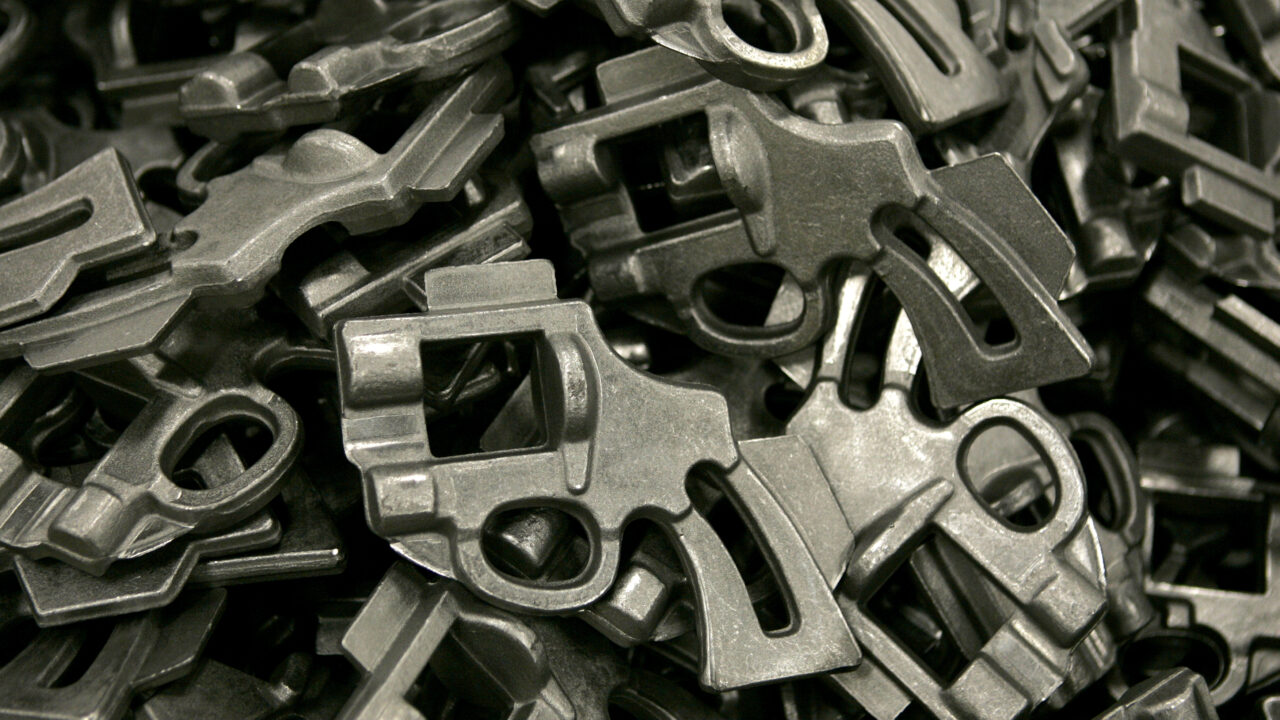We Need to Broaden Our Conversation About Guns
Looking at gun manufacturing — rather than just gun ownership — can help bridge America's red-blue divide. Forgings from the first cut of a .44 Magnum handgun are piled in a bin at the Smith & Wesson factory in Springfield, Mass. Photo: Charles Krupa / AP.
Forgings from the first cut of a .44 Magnum handgun are piled in a bin at the Smith & Wesson factory in Springfield, Mass. Photo: Charles Krupa / AP.
There is a familiar pattern after the mass shootings that have become a well-known feature of American life.
The initial shock and grief gives way to demands for greater regulation of gun ownership by Democrats, while Republicans dismiss such measures and blame mental illness instead. But if we actually want to do something about it, we need to have new conversations.
We often talk about where and how weapons are purchased—but rarely where and how they are manufactured. These realities challenge the conventional way we talk about guns in terms of a “culture war” between red and blue states.
For example, the blue states of Massachusetts and Connecticut have some of the strictest regulations on firearms carrying and possession. But they are also major sites of gun facturing in this country. The weapons used in the 2018 Parkland shooting, for example, were manufactured by Smith and Wesson, a gun manufacturer based in Massachusetts.
The deeper and bigger point is that the U.S. is the world’s principal supplier of weapons.
The U.S. weapons industry makes both heavy weapons like military aircraft, bombs, and missiles, and small arms like rifles and handguns. As of 2021, over 40 percent of the world’s exported arms came from the United States—many of them manufactured in deep blue states.
Blue states with strict gun laws often suffer gun violence when weapons are trafficked in from red states with looser gun laws. Similarly, many countries surrounding the U.S. with high rates of gun violence, like Mexico, obtain guns both legally and illegally from this country.
With no system to effectively control and track who ends up with those guns, these weapons are often obtained by military units or police that have committed human rights abuses or who work with criminal groups.
The mass production of guns has been a disaster—one that has dire consequences not only for U.S. communities, but for those all over the world
For example, in September 2014, local police in the state of Guerrero, Mexico were responsible for the disappearance and murder some 43 students from the Ayotzinapa Rural Teachers College. The police were armed with rifles that were supplied legally from Colt, a prominent U.S. gun manufacturer headquartered in Connecticut.
Most Americans, including most gun owners, support some level of gun control or background checks. But gun lobbies like the NRA, which are so influential in red states, don’t really represent gun owners— they represent gun manufacturers. In fact, of the NRA’s corporate partners, several are gun manufacturers based in blue states.
As long as these corporations flood the U.S. and the world with guns, debate over who accesses these guns won’t get us very far.
So our current conversation serves the status quo. It further divides people in this country according to a “culture war” narrative, where politicians clash in rhetoric, but everyone knows that the actual situation will not change.
From the perspective of ending bloodshed, this isn’t working. We need to try something different, and it will mean some deeper interrogation about where these weapons come from.
This could mean reviewing the practices and impacts of gun manufacturers, demanding greater regulation, and—as with any product that causes far reaching harm—having a public conversation about whether companies should be allowed to make these weapons at all.
The mass production of guns has been a disaster—one that has dire consequences not only for U.S. communities, but for those all over the world. New ways of thinking will help us fulfill our responsibility to protect vulnerable people not just in the U.S., but people everywhere.
Your support matters…Independent journalism is under threat and overshadowed by heavily funded mainstream media.
You can help level the playing field. Become a member.
Your tax-deductible contribution keeps us digging beneath the headlines to give you thought-provoking, investigative reporting and analysis that unearths what's really happening- without compromise.
Give today to support our courageous, independent journalists.






You need to be a supporter to comment.
There are currently no responses to this article.
Be the first to respond.